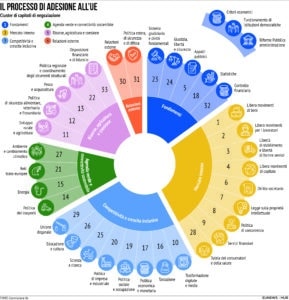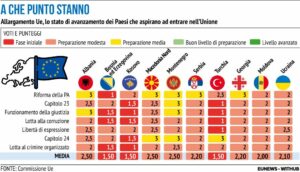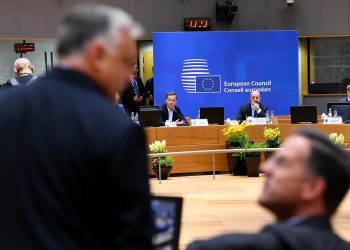Brussels – One has to look at the details to break the deadlock at a summit, which has been looming for weeks over the Ukraine issue. On which all the compromises between the Union’s leaders ultimately play out. If there is still no way out of the deadlock on the unblocking of negotiations on medium-/long-term EU financial support to Kyiv, the stumbling block on Ukraine’s EU accession negotiations could see a political light at the end of a tunnel that – likely – will occupy much of the first day of the European Council.

“Enlargement is not a theoretical issue. It is a merit-based and legally detailed process with pre-conditions,” Viktor Orbánr explained this morning (Dec. 14) upon his arrival at the European Council and the real culprit for the stalemate at the table of heads of state and government of the 27 member countries. The Hungarian prime minister pointed out that “we have set seven pre-conditions” for the start of Ukraine’s accession negotiations and “even according to the assessment of the European Commission, three pre-conditions have not been met.” This explains – at least on the merits of the issue, without considering the revenge on the plan to release EU funds to Hungary – the Hungarian leader’s obstructionism: “In my estimations, there are even more [unmet pre-conditions, ed], but three are enough to say that there is no possibility to start negotiating Ukraine’s membership in the Union now.” When pressed about a possible compromise during today’s discussions, Orbán said that “Hungary did not set the pre-conditions, but the European Commission did, and that they are public.” The Hungarian premier was referring to the priorities set by the EU executive and accepted by the 27 Member States when Ukraine was granted candidate status at the European Council meeting on June 23, 2022. Already by June this year – as noted by the Commission’s oral report – two out of seven pre-conditions (reform of two judicial bodies and media area) had been completed, with two more brought to completion in the following four months: reforms of the Constitutional Court and anti-money laundering regulations, as noted in the Enlargement 2023 package. Priorities that have not yet been fully met include fighting corruption, reducing the influence of oligarchs, and protecting national minorities. According to what the President of the EU executive, Ursula von der Leyen, disclosed on November 8, when the Package was published, “we will present a new report in March 2024,” in which Ukraine’s (but also Moldova’s and Georgia’s) progress on the still outstanding pre-conditions will be assessed. Confidence at the Berlaymont -and in 26 out of 27 capitals – lies in the fact that in Kyiv “the decision to grant EU candidate status has created a powerful reform dynamic, despite the ongoing war, with strong support from the Ukrainian people,” reads the specific report. This is where the sensitive issue of opening accession negotiations comes in. The Commission’s recommendation to the European Council is a yes to open accession negotiations with Ukraine but also to adopt a negotiating framework “once some key measures are implemented.” The difference is subtle but substantial. The European Council – the body that sets the Union’s priorities and general policy directions – has the task of making a political decision on the start of a third country’s accession process and the most decisive moment (the start of negotiations, precisely). But the task of formally grounding the decision lies with the Council of the European Union – the decision-making body that represents the governments of the 27 member countries and holds legislative power together with the European Parliament – which, according to the Treaties, has the final word on the matter: “Accession negotiations cannot begin until all EU governments agree, in the form of a unanimous decision of the Council of the EU, on a framework or mandate for negotiations with the candidate country.” In other words, at the summit of 27 leaders today and tomorrow, a decision may be made for a political solution (starting accession negotiations with Ukraine) but without implying that Kyiv can bypass the completion of the three missing pre-conditions.
This is where the sensitive issue of opening accession negotiations comes in. The Commission’s recommendation to the European Council is a yes to open accession negotiations with Ukraine but also to adopt a negotiating framework “once some key measures are implemented.” The difference is subtle but substantial. The European Council – the body that sets the Union’s priorities and general policy directions – has the task of making a political decision on the start of a third country’s accession process and the most decisive moment (the start of negotiations, precisely). But the task of formally grounding the decision lies with the Council of the European Union – the decision-making body that represents the governments of the 27 member countries and holds legislative power together with the European Parliament – which, according to the Treaties, has the final word on the matter: “Accession negotiations cannot begin until all EU governments agree, in the form of a unanimous decision of the Council of the EU, on a framework or mandate for negotiations with the candidate country.” In other words, at the summit of 27 leaders today and tomorrow, a decision may be made for a political solution (starting accession negotiations with Ukraine) but without implying that Kyiv can bypass the completion of the three missing pre-conditions.
Reassessment will be postponed – as clarified by the von der Leyen cabinet – to the March 2024 report, with the formal and final decision by the 27 EU governments in the Council. Without, however, losing the right of veto of Prime Minister Orbán is making a strong case for these days. If this scenario materializes, it is presumable that emphasis will be on the conclusions of the 27 leaders’ summit on the role of the EU Council in adopting the negotiating framework. At the moment, the draft viewed by Eunews reports that the European Council “decides to open accession negotiations with Ukraine and the Republic of Moldova” and “invites the Council [of the European Union, ed.]to adopt the respective negotiating frameworks once the measures have been adopted” indicated in the conclusions on enlargement of the General Affairs Council on Tuesday (Dec. 12)
Ukraine and beyond. How to join the EU
The EU enlargement process begins with a non-EU state submitting a formal application for membership to the rotating presidency of the Council of the European Union. Union membership first requires passing the Copenhagen criteria (established at the European Council in the Danish capital in 1993 and strengthened by the EU leaders’ meeting in Madrid two years later). These criteria are divided into three groups of basic requests that the Union addresses to the country that has applied for membership: rule of law and democratic institutions (including respect for human rights and the protection of minorities), stable market economy (ability to cope with market forces and competitive pressure), and fulfillment of its obligations (effectively implementing the body of EU law and meeting the objectives of Political, Economic and Monetary Union).
Once the Commission’ gives its positive opinion, a country achieves the status of candidate country with the approval of all members of the Union. After this, the Commission recommends to the EU Council to open negotiations that, again, require the unanimous go-ahead from the member countries: this allows to begin the negotiating chapters (varying in number), the purpose of which is to prepare the candidate, particularly on the implementation of the necessary judicial, administrative and economic reforms. When negotiations are completed, and EU enlargement is possible in terms of absorption capacity, the parties sign the Accession Treaty(with terms and conditions for accession, including any safeguard clauses and transitional provisions), which must first be approved unanimously by the European Parliament and the Council.
Only for the Western Balkans is there a parallel – and separate – process to the EU accession negotiations, which nonetheless impacts EU enlargement. The stabilization and association process aims at helping Balkan partners for eventual accession through political and economic objectives that stabilize the region and create a free trade area. After establishing a general framework of bilateral relations between the European Union and the partner country, signing the Stabilization and Association Agreement offers the prospect of accession.

![I leader dell'UE nel vertice di ottobre 2023 [foto: European Counci]](https://www.eunews.it/wp-content/uploads/2023/12/euco2310-350x250.jpg)


![Xavier Bettel (destra), con Péter Szijjarto, ministro degli Esteri e affari europei dell'Ungheria [Bruxelles, 12 dicembre 2023. Foto: European Council]](https://www.eunews.it/wp-content/uploads/2023/12/bettel-231212-350x250.jpg)

![Il presidente dell'Ucraina, Volodymyr Zelensky, in collegamento con i leader dell'UE [Bruxelles, 14 dicembre 2023. Foto: European Council]](https://www.eunews.it/wp-content/uploads/2023/12/zelensky-231214-75x75.jpeg)




